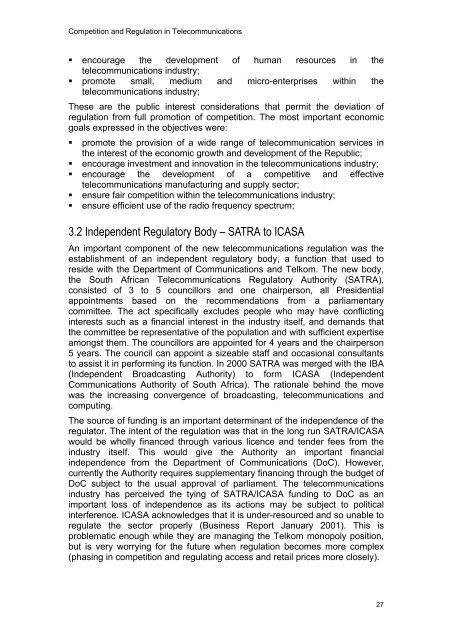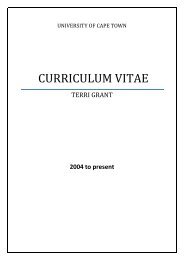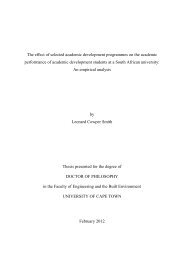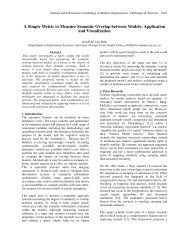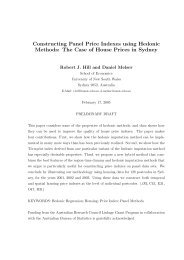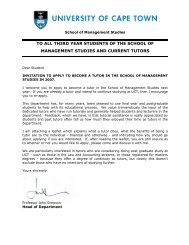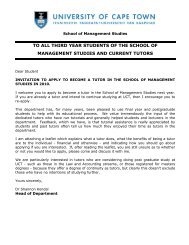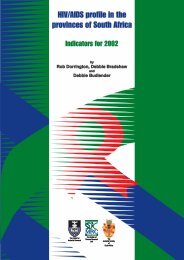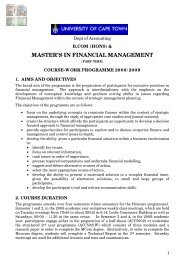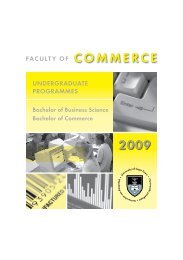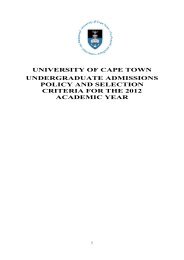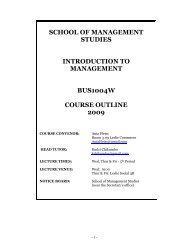Competition and Regulation in the Telecommunications Industry in ...
Competition and Regulation in the Telecommunications Industry in ...
Competition and Regulation in the Telecommunications Industry in ...
Create successful ePaper yourself
Turn your PDF publications into a flip-book with our unique Google optimized e-Paper software.
<strong>Competition</strong> <strong>and</strong> <strong>Regulation</strong> <strong>in</strong> <strong>Telecommunications</strong>• encourage <strong>the</strong> development of human resources <strong>in</strong> <strong>the</strong>telecommunications <strong>in</strong>dustry;• promote small, medium <strong>and</strong> micro-enterprises with<strong>in</strong> <strong>the</strong>telecommunications <strong>in</strong>dustry;These are <strong>the</strong> public <strong>in</strong>terest considerations that permit <strong>the</strong> deviation ofregulation from full promotion of competition. The most important economicgoals expressed <strong>in</strong> <strong>the</strong> objectives were:• promote <strong>the</strong> provision of a wide range of telecommunication services <strong>in</strong><strong>the</strong> <strong>in</strong>terest of <strong>the</strong> economic growth <strong>and</strong> development of <strong>the</strong> Republic;• encourage <strong>in</strong>vestment <strong>and</strong> <strong>in</strong>novation <strong>in</strong> <strong>the</strong> telecommunications <strong>in</strong>dustry;• encourage <strong>the</strong> development of a competitive <strong>and</strong> effectivetelecommunications manufactur<strong>in</strong>g <strong>and</strong> supply sector;• ensure fair competition with<strong>in</strong> <strong>the</strong> telecommunications <strong>in</strong>dustry;• ensure efficient use of <strong>the</strong> radio frequency spectrum;3.2 Independent Regulatory Body – SATRA to ICASAAn important component of <strong>the</strong> new telecommunications regulation was <strong>the</strong>establishment of an <strong>in</strong>dependent regulatory body, a function that used toreside with <strong>the</strong> Department of Communications <strong>and</strong> Telkom. The new body,<strong>the</strong> South African <strong>Telecommunications</strong> Regulatory Authority (SATRA),consisted of 3 to 5 councillors <strong>and</strong> one chairperson, all Presidentialappo<strong>in</strong>tments based on <strong>the</strong> recommendations from a parliamentarycommittee. The act specifically excludes people who may have conflict<strong>in</strong>g<strong>in</strong>terests such as a f<strong>in</strong>ancial <strong>in</strong>terest <strong>in</strong> <strong>the</strong> <strong>in</strong>dustry itself, <strong>and</strong> dem<strong>and</strong>s that<strong>the</strong> committee be representative of <strong>the</strong> population <strong>and</strong> with sufficient expertiseamongst <strong>the</strong>m. The councillors are appo<strong>in</strong>ted for 4 years <strong>and</strong> <strong>the</strong> chairperson5 years. The council can appo<strong>in</strong>t a sizeable staff <strong>and</strong> occasional consultantsto assist it <strong>in</strong> perform<strong>in</strong>g its function. In 2000 SATRA was merged with <strong>the</strong> IBA(Independent Broadcast<strong>in</strong>g Authority) to form ICASA (IndependentCommunications Authority of South Africa). The rationale beh<strong>in</strong>d <strong>the</strong> movewas <strong>the</strong> <strong>in</strong>creas<strong>in</strong>g convergence of broadcast<strong>in</strong>g, telecommunications <strong>and</strong>comput<strong>in</strong>g.The source of fund<strong>in</strong>g is an important determ<strong>in</strong>ant of <strong>the</strong> <strong>in</strong>dependence of <strong>the</strong>regulator. The <strong>in</strong>tent of <strong>the</strong> regulation was that <strong>in</strong> <strong>the</strong> long run SATRA/ICASAwould be wholly f<strong>in</strong>anced through various licence <strong>and</strong> tender fees from <strong>the</strong><strong>in</strong>dustry itself. This would give <strong>the</strong> Authority an important f<strong>in</strong>ancial<strong>in</strong>dependence from <strong>the</strong> Department of Communications (DoC). However,currently <strong>the</strong> Authority requires supplementary f<strong>in</strong>anc<strong>in</strong>g through <strong>the</strong> budget ofDoC subject to <strong>the</strong> usual approval of parliament. The telecommunications<strong>in</strong>dustry has perceived <strong>the</strong> ty<strong>in</strong>g of SATRA/ICASA fund<strong>in</strong>g to DoC as animportant loss of <strong>in</strong>dependence as its actions may be subject to political<strong>in</strong>terference. ICASA acknowledges that it is under-resourced <strong>and</strong> so unable toregulate <strong>the</strong> sector properly (Bus<strong>in</strong>ess Report January 2001). This isproblematic enough while <strong>the</strong>y are manag<strong>in</strong>g <strong>the</strong> Telkom monopoly position,but is very worry<strong>in</strong>g for <strong>the</strong> future when regulation becomes more complex(phas<strong>in</strong>g <strong>in</strong> competition <strong>and</strong> regulat<strong>in</strong>g access <strong>and</strong> retail prices more closely).27


